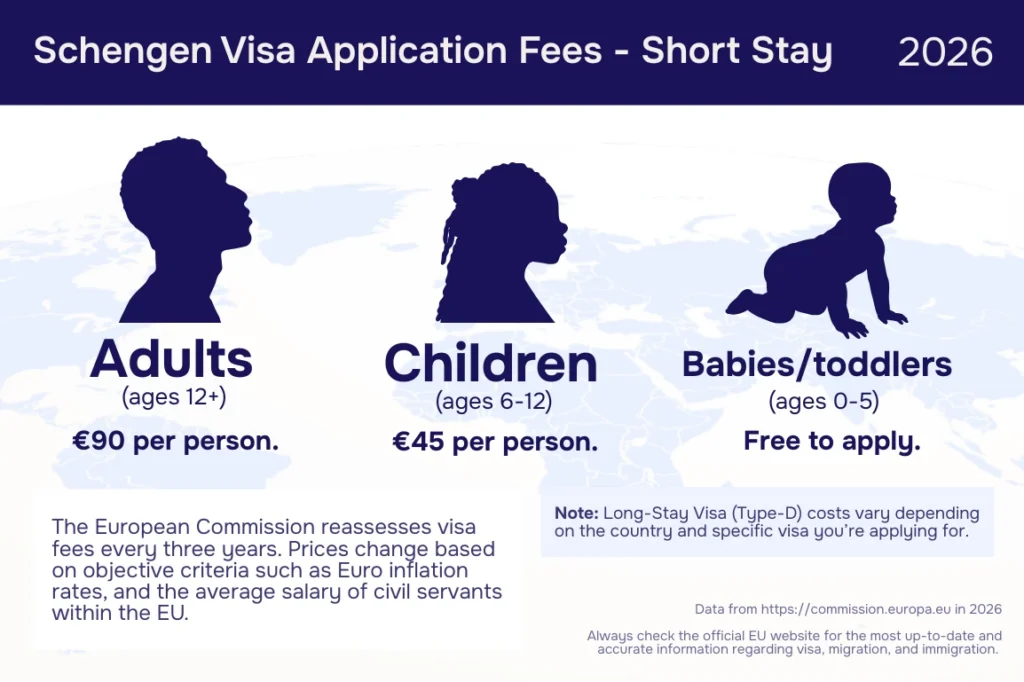Home > Schengen Visa Costs in 2026

Schengen Visa Costs in 2026
Getting a Schengen visa means you're opens the door to 29 countries in Europe.
It's a truly unique visa that gives travelers simplified movement across multiple different borders.
Some of the most popular places in Europe are part of the Schengen zone, such as Paris, Rome, and Amsterdam, so it’s a great visa to have, especially if you have a bit of the "travel bug".
However, applying for a Schengen visa isn't free.
There are a few things you'll need to be ready to pay for, such as the Schengen visa fees, any application center service fees (which for many, are required), and additional expenditures, like Schengen travel insurance (which is mandatory for Schengen visa applications).

Schengen visa costs and financial requirements
The standard Schengen visa fee is €90 for adults, €45 for children aged 6-12, and free for children under the age of 6.
The fees we are referring to here are for the most common Schengen visa: Type C, short stay. Short-stay visas are for trips fewer than 90 days in length.
If you're applying for a different type of Schengen visa (such as a long-stay visa), costs vary depending on the country you're applying to, as well as the specific visa.
Most people will need to pay the fee, though it is worth mentioning that some applicants, such as some students or diplomats, may be exempt from fees or have reduced rates.
Some countries also have agreements with other countries, allowing discounted or differing rates for citizens of specific nationalities (though this is uncommon).
While requirements do vary, the average person will need to pay the full price, non-negotiable.
Visa fees are mandatory, and it's also important to understand that they're non-refundable, even if your visa application is rejected.
Get Schengen Compliant Insurance Today
Schengen visa insurance is mandatory for applications. Download your certificate now.
Now that we've talked about the visa application fee itself, we need to mention service fees. Service fees are entirely separate from visa fees.
If you utilize the services of a trusted visa processor (such as TLScontact, for example), you will likely need to pay service fees in addition to visa fees.
Whether or not you need to apply for your visa through a visa processor depends on the country you live in and the country you're applying to (France, Italy, etc.).
Governments decide whether or not they are going to work with a visa processor, and which ones in which locations.
Now that you're familiar with the fee itself and service fees, you also need to remember that there are other costs associated with applying for a Schengen visa.
For instance, travel insurance is mandatory, and there are specific Schengen visa travel insurance requirements your policy needs to meet.

Schengen visa fees for multiple entry
Schengen visas typically allow you to enter the Schengen area (as a whole) once.
This means that once you leave, even if your visa hasn't expired yet, you won't be allowed re-entry.
If you're planning to enter and exit the Schengen area more than once during the validity of your visa, you can apply for a multiple-entry visa.
The fee remains the same as the single-entry Schengen visa.
Note: If you’re a citizen of a visa-exempt country (such as the US, UK, Canada, or Australia), you can exit and enter the Schengen area as you please, as long as your time spent in the Schengen area doesn’t exceed 90 days in any given 180-day period. You also do not need a Schengen visa for these short trips.
